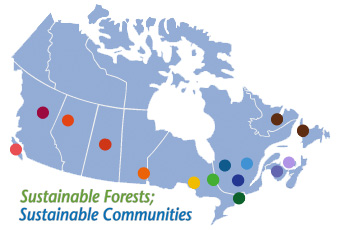 For the past 20 years, Model Forests have been at the forefront of innovative ways to move the forest sector from a cyclical economy to one that is more diverse, has a higher value, and an increasingly stable proposition. Efforts to lead the way in small business support initiatives which has paid dividends, through activities such as: forest certification, the development of non-timber forest products, improved forest inventories, and an increased opportunity for greater Aboriginal and community participation. As a result of its success, the Model Forest concept has grown to 60 sites in over 20 countries. Looking to its next set of needs, Canada’s rural communities and the CMFN will need to: support the industry’s transformation agenda; connect our small businesses and communities with emerging markets; and, ensure the stewardship of our forests according to Canadian values. The Canadian Model Forest Network is committed to working with its partners to addressing and finding appropriate solutions based on grassroots knowledge, supported by its diverse partnership and linkages to expertise both nationally and internationally.
For the past 20 years, Model Forests have been at the forefront of innovative ways to move the forest sector from a cyclical economy to one that is more diverse, has a higher value, and an increasingly stable proposition. Efforts to lead the way in small business support initiatives which has paid dividends, through activities such as: forest certification, the development of non-timber forest products, improved forest inventories, and an increased opportunity for greater Aboriginal and community participation. As a result of its success, the Model Forest concept has grown to 60 sites in over 20 countries. Looking to its next set of needs, Canada’s rural communities and the CMFN will need to: support the industry’s transformation agenda; connect our small businesses and communities with emerging markets; and, ensure the stewardship of our forests according to Canadian values. The Canadian Model Forest Network is committed to working with its partners to addressing and finding appropriate solutions based on grassroots knowledge, supported by its diverse partnership and linkages to expertise both nationally and internationally.
 Model Forests have been supported primarily through the leadership of the federal government, and despite reduced funding, the CMFN and its partners fully intend to help strengthen a sector that is able to withstand the test of time and be an important contributor to the economic well-being of this country. It is committed to continuing to build on existing and new partnerships, in order to make its goals and objectives across Canada a reality.
Model Forests have been supported primarily through the leadership of the federal government, and despite reduced funding, the CMFN and its partners fully intend to help strengthen a sector that is able to withstand the test of time and be an important contributor to the economic well-being of this country. It is committed to continuing to build on existing and new partnerships, in order to make its goals and objectives across Canada a reality.










